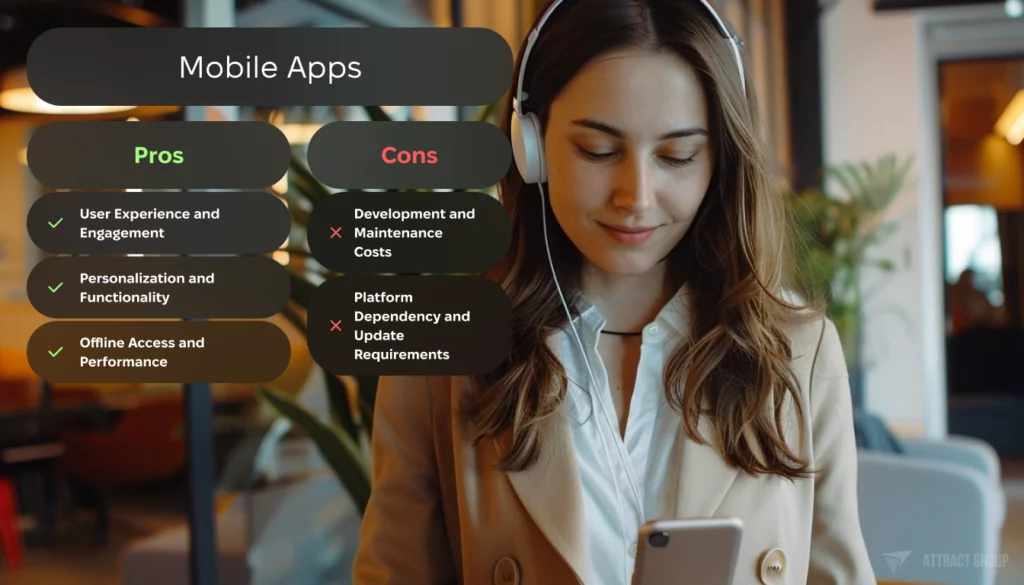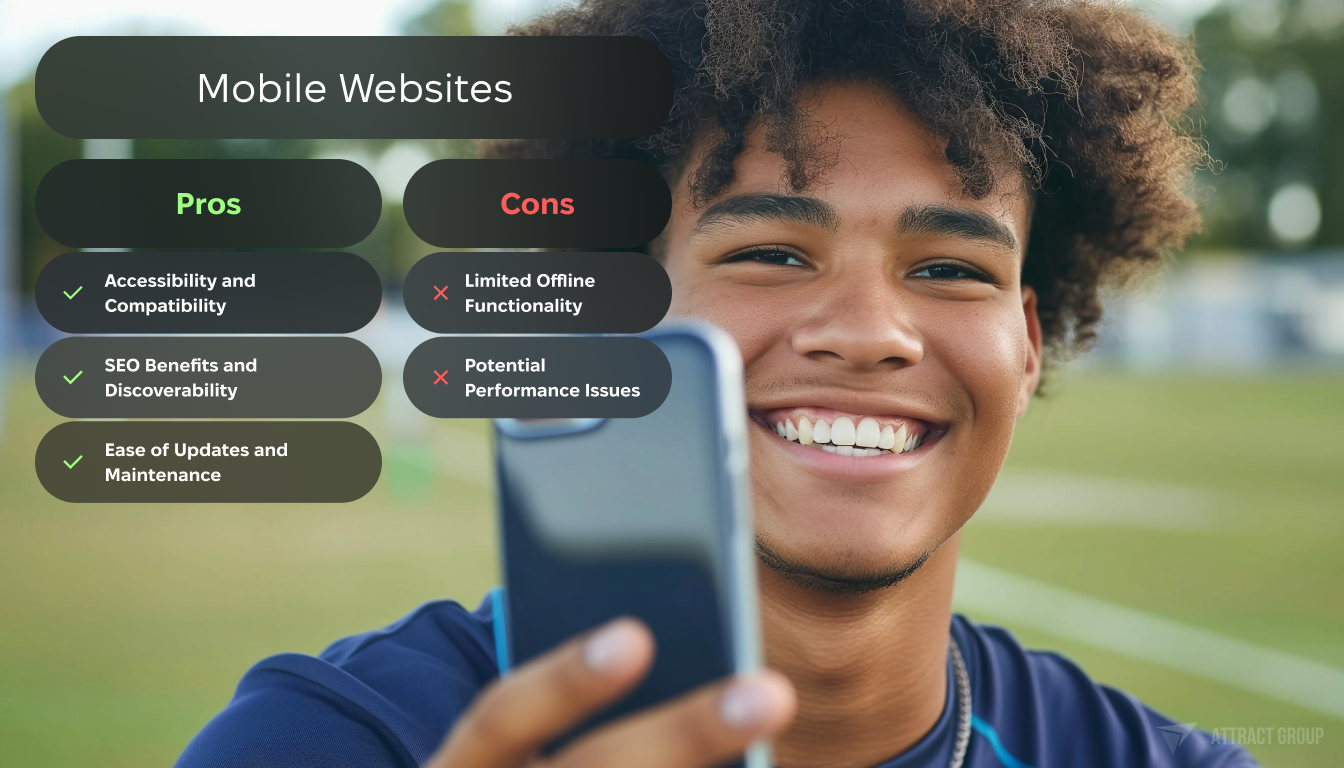Mobile App vs. Mobile Website: Choosing the Best Solution for Your Business
 27 February 2024
27 February 2024? Listen to the Summary of this article in Audio
Decision-making in the digital arena often involves determining the best platform to reach and engage your audience. The debate between investing in a web app vs mobile app, or considering the more universal approach of a mobile friendly website vs app, is a significant one for businesses aiming to increase their online presence. The advantages of mobile app vs website have to be weighed according to the unique demands of your business. Whether it is about building an app vs website or exploring the realms of mobile apps vs websites, the choice is pivotal and can determine the trajectory of your company’s digital strategy.
Understanding the nuances that differentiate these platforms is critical. A mobile app can offer a depth of functionality conducive to user engagement, while a mobile website can boast broader accessibility and immediacy. Businesses must reflect on their end-goals and resources to conclude whether the path of app vs mobile website is aligned with their overall objectives and customer expectations.
Key Takeaways
- Choosing between a mobile app and website hinges on end-goals and user engagement strategies.
- Mobile websites are instantly available across multiple devices, offering greater reach and easier maintenance.
- Apps excel in user experience through personalization and leveraging device-specific features.
- Comparing cost-effectiveness is essential as apps typically require a greater investment than websites.
- Technical requirements, from updates to compatibility, are key differentiators in the app vs website debate.
- Understanding your target audience’s preferences can direct the decision towards an app or a mobile website.
Introduction to Mobile Solutions
As the digital landscape evolves, the distinction between a mobile app website and a mobile app becomes increasingly important for businesses strategizing their approach in the mobile domain. The critical difference between app and website is in their method of engagement and deployment. While both serve as gateways for mobile users to interact with a business, they cater to differing user behaviors and preferences.
Considering the mobile apps for retail industry, tailoring the customer experience through apps can enhance the shopping journey. Apps for retailers not only streamline transactions but also enable personalized outreach through push notifications and loyalty programs. However, the mobile app website counterpart offers universal accessibility without the need for downloading software, an advantage that positions websites and mobile apps in different scopes of use.
Selecting the optimal solution — whether it be mobile apps for websites or standalone applications — impacts critical aspects of a business, including customer satisfaction, marketing effectiveness, and ultimately, the sales potential. The deliberation process involves thorough analysis of various factors, summarized in the comparison below:
| Aspect | Mobile App | Mobile Website |
|---|---|---|
| Accessibility | Downloaded and installed on devices | Available through browser access on multiple devices |
| User Engagement | High engagement through device-specific features and offline access | Instant engagement via clickable links and easy sharing |
| Cost | Higher initial development and maintenance cost | More cost-effective with universal compatibility and lower upkeep expenses |
| Functionality | Tailored to device capabilities with potential offline performance | General functionality with reliance on internet connectivity |
| Development Time | Longer development cycle due to app store approvals | Relatively quicker launch with immediate content updates |
| Discoverability | Found within app stores and requires marketing to boost visibility | Easily discoverable through search engines and links |
The pivotal nature of choosing between mobile apps for websites and dedicated mobile applications necessitates a strategic approach, taking into account both current customer engagement metrics and projected market trends. In essence, the deployment of either solution should not only echo the present needs but also the evolutionary pace of the business’s mobile outreach ambitions.
Understanding the Basics: What is a Mobile App and What is a Mobile Website?
As we delve into the realm of mobile technology – an essential component of our daily lives – it is pivotal to explain mobile technology in detail, especially when it comes to understanding what differentiates a mobile website from a mobile app. Mobile websites and apps are the cornerstones of mobile presence, yet they serve uniquely different roles in how we interact with our digital world.
A mobile website operates much like any other website, though it is designed specifically for the smaller screens of smartphones and tablets. These websites are composed of linked HTML pages that can be accessed over the internet using a mobile browser. The responsive design ensures that content, images, and videos scale correctly for ease of navigation on a touch-screen interface, allowing for a functional and accessible user experience. Mobile websites can also tap into mobile-specific features, such as click-to-call or GPS-driven mapping functions to enhance the utility for mobile users.

On the flip side, an app is a software application that is downloaded and installed onto a user’s mobile device, permitting it to operate independently of a web browser. Apps often provide a more dynamic and interactive experience, harnessing the full capabilities of the device’s hardware and software. They can function without an active internet connection by storing important data natively on the device, making them indispensable for various tasks and entertainment.
Let’s consider in further depth the diverging paths these two digital assets take by examining their distinctive attributes:
| Feature | Mobile Website | Mobile App |
|---|---|---|
| Installation | None required; accessed via web browser | Must be downloaded and installed from app stores |
| Internet Connectivity | Requires connection for full functionality | Can function offline; synchronizes data when connected |
| Device Integration | Limited by browser capabilities | Deep integration with device’s features and sensors |
| Cost and Maintenance | Generally less expensive to develop and maintain | Higher costs due to platform-specific development |
| Content Updates | Can be updated instantly and universally | Requires app version updates; subject to approval processes |
| User Experience | Simplified and universal across devices | Personalized and often more engaging interactions |
In conclusion, understanding the difference between a website and an app is essential for businesses contemplating their entry into the digital mobile arena. To create a mobile website or app, one must consider not only the technical aspects but also the user engagement and long-term goals associated with each platform, making an informed decision based on the precise needs of their target audience.
The Evolution of Mobile Technology and User Behavior
The landscape of digital interaction has undergone a transformative evolution over the past few years, particularly with the rapid increase in mobile phone users, now accounting for 65% of the global population. This uptick in mobile engagement is a testament to the changing user behavior, with a clear preference for accessing the internet on-the-go. Consequently, this shift necessitates businesses to adapt accordingly, emphasizing the importance of a mobile ready online store to stay competitive.
As businesses grasp the trend towards mobile usage, they increasingly recognize the mobile website advantages that are essential to their online strategy. One such advantage is the ability to reach a wider audience seamlessly, without the barriers of device-specific applications. Tapping into this mobile-first mentality, companies are proactively looking to build a mobile website that delivers a satisfactory user experience reflective of their desktop counterpart.
Responsive web design has become the gold standard, ensuring that regardless of the device size — be it a large tablet or a compact smartphone — users enjoy an unhampered browsing experience. This adaptability is not a mere luxury but a necessity, considering over half of the web traffic now originates from mobile devices.
When businesses are ready to create a website and mobile app, they often face the challenge of balancing quality with mobile website costs. Budgeting for mobile development requires a careful examination of both immediate needs and future scalability, as well as an understanding of the resources available. While constructing an app may offer a highly tailored user experience, the how to build a mobile website conversation tends to align more closely with cost-effectiveness and broader accessibility.
| Feature | Benefits | Considerations |
|---|---|---|
| Responsiveness | Adaptive design for various screen sizes | Ensuring compatibility with all devices |
| User Accessibility | Instant access without app downloads | Greater potential for user reach and retention |
| Cost Efficiency | Lower development and maintenance expenses than apps | Optimization of budget allocation for marketing and upgrades |
| SEO and Visibility | Elevated discoverability through search engines | Strategic content and SEO practices to enhance online presence |
| Content Management | Content updates are universal and immediate | Continuous content relevancy and engagement |
The conversation surrounding mobile technology’s trajectory lies at the intersection of evolving consumer behavior and strategic business adaptation. Companies looking forward must ensure they are not only current with the existing trends, such as building a mobile-responsive storefront, but also prepared for the foreseeable shifts in technology that may redefine user expectations once more.
Primary Considerations for Businesses Going Mobile
In today’s fast-paced digital marketplace, embarking on a mobile presence is a significant decision that impacts a business’s trajectory towards success. Weighing the options between mobile apps versus mobile websites involves careful scrutiny of various strategic factors. Each path offers distinct benefits and challenges, and the right choice hinges on the precise blend of target user demands, business aspirations, financial capacity, and speed of execution. This section explores the crucial facets that businesses must evaluate when determining the optimum mobile route — is it better to use an app or the website, a question that can shape the future of any organization’s digital interface with its users.

Assessing Target Audience and User Behavior
A deep understanding of the intended customer base, alongside their online behavior and preferences, is critical when considering apps versus websites. The dynamics of user interaction with mobile platforms vary greatly — some users may prefer the convenience and immediacy of a mobile website, while others may look for the deeper engagement and tailored experience an app can offer. Thus, assessing whether your audience primarily seeks information quickly or will benefit from an interactive, application-based environment is key.
Aligning with Business Goals and Objectives
The alignment of a mobile strategy with the core goals and objectives of an enterprise is pivotal. A mobile website might be appropriate for broad marketing outreach and easy content updates. In contrast, an app could better serve businesses looking for higher user engagement with extensive functionality, such as real-time tracking or personalized recommendations — features that tip the advantages of apps over websites.
Budgetary Constraints: Cost Implications of Apps vs. Websites
Financial considerations underpin the mobile website vs app debate. Building and maintaining a website is often more budget-friendly compared to the high costs associated with the development and upkeep of apps for various platforms. Consideration of the long-term investment must include not only the initial outlay but also ongoing maintenance, with a clear understanding that a lower initial cost does not necessarily entail a lower total cost of ownership.
Technical Requirements and Maintenance
As businesses ponder website vs app, it is essential to contemplate the technical requirements and the associated maintenance load. Mobile websites often requir less intricate development with cross-platform compatibility, which simplifies updates. Conversely, apps demand a more rigorous development process, incurring higher costs for ensuring they stay up-to-date and run seamlessly across different operating systems.
Speed to Market: Development Time for Apps vs. Websites
The agility with which a business can venture into the mobile domain can be a decisive factor. App vs website timelines can dramatically differ, with mobile websites generally boasting quicker launch times and the ability to push instant updates. Mobile apps usually require extensive testing and approval from app marketplaces, introducing potential delays that must be factored into the deployment schedule.
Our team can assess your business needs and recommend the optimal mobile solution – app, website, or both.
The Pros and Cons of Mobile Apps
When considering the strengths of mobile apps in the current digital market, businesses need to weigh the benefits of a dedicated app against the universal nature of a mobile website. Deciding on the value of creating an app involves a thorough understanding of what these apps bring to the user experience as well as the technical and fiscal implications for the business.

Advantages of Mobile Apps Over Websites
One of the foremost advantages of mobile apps is their ability to enrich the user experience with advanced personalization. By leveraging device capabilities like GPS and camera, apps offer a more intuitive interface that adapts to individual user behavior and preferences. The question of why mobile app is better than website often finds its answer in the app’s capacity for user engagement through features tailored to the mobile environment. In addition, mobile app advantages extend to retaining efficiency offline, granting users access to essential functions and information without the need for an active internet connection. This is a pivotal consideration in the debate of app or website which is better for customer retention and engagement.
User Experience and Engagement
Businesses asking why are apps better than websites should consider the statistics around customer engagement. Apps provide a platform for more direct and continuous interaction with users, boosting engagement rates. The convenience of accessing services with a single tap and the appeal of a fluid user-friendly interface are just a few reasons why a mobile app can be superior for customer retention.
Personalization and Functionality
The customized user journey offered by apps, based on user data, search history, and preferences, greatly surpasses what can be accomplished on a website. Mobile apps can learn and adapt to the user, making them incredibly effective for personalizing content and functionalities, which enhances user satisfaction and loyalty.
Offline Access and Performance
An undisputed mobile app advantage is its ability to perform offline or in low connectivity scenarios. Apps can store data locally on the device, which allows for uninterrupted access to key features. For industries where constant connectivity cannot be assured, this offline capability is a significant benefit.
Disadvantages of Mobile Apps
Yet, for all their strengths, mobile apps come with their own set of challenges. They tend to be more costly to develop and maintain, especially if the business aims to serve customers on various platforms, considering the need for different versions for iOS, Android, and potentially other systems. The ongoing maintenance and the requirement for routine updates, which need app store approval, add to the operational efforts and costs.
Development and Maintenance Costs
Businesses must be prepared for the significant investment in both time and money that mobile apps demand. From the initial design and development stages through to regular updates and dealing with platform-specific nuances, the costs can be notably higher than those for maintaining a mobile-friendly website.
Platform Dependency and Update Requirements
Platform dependency is another critical factor that elevates costs and complicates production. Separate builds are necessary for each operating system, and updates are subject to approval by the respective app stores, which can delay delivery to users. This reliance can slow down the ability to react to market demands promptly.
In assessing the advantages of mobile web apps, businesses must judiciously evaluate their specific needs and decide if the investment in a mobile app offers a justifiable return, especially when considering building an established mobile presence.
Our full-stack developers can build a high-performing, feature-rich app tailored to your business goals.
The Pros and Cons of Mobile Websites
When deliberating the digital strategy for a business, the mobile website vs app discussion often boils down to specific advantages and trade-offs. Mobile websites have emerged as accessible solutions with a host of benefits that make them particularly appealing for broad customer outreach. Yet, despite their versatility and ease of use, they also bring forward certain limitations that may influence a business’s decision.

Advantages of Mobile Websites
Businesses often question why websites are better than apps. The answer typically lies in the universal accessibility and compatibility offered by mobile websites. A single responsive site can serve users across a diverse range of devices and browsers, negating the need to develop separate apps for different platforms. This not only extends the potential reach but also makes for a practical and streamlined user journey. Enhanced SEO capabilities are a distinct benefit as well, as mobile websites tend to rank in search engine results, thus increasing visibility and driving organic traffic.
Accessibility and Compatibility
Mobile website or app? There’s no contest when it comes to immediate accessibility. A mobile website can be reached with a simple URL, bypassing the need for installation and making it readily available at a user’s fingertips. This compatibility with various devices simplifies cross-platform marketing efforts and increases the likelihood of reaching a larger audience.
SEO Benefits and Discoverability
The potential for a mobile website to be easily discovered through search engines cannot be overstated. Unlike apps that are confined to app stores, mobile websites can be indexed by search engines and appear in the results for relevant queries. This enhances visibility and traffic, a consideration that can significantly impact a business’s online presence.
Ease of Updates and Maintenance
Maintaining and updating a mobile website is typically simpler and less costly than for an app. Web content can be revised or expanded instantly, with changes appearing in real time across all devices. This allows businesses to keep their offerings fresh and engage their customer base with the latest information without any additional user action required.
Disadvantages of Mobile Websites
Despite the compelling reasons to support mobile apps vs mobile websites, it’s crucial to recognize the limitations of mobile websites. The most significant is the lack of offline functionality, which can be a stumbling block in situations where users cannot maintain a constant internet connection. Additionally, performance issues could arise from browser restrictions, and while mobile websites are broadly accessible, they may not offer as robust of an experience as a dedicated app.
Limited Offline Functionality
One clear advantage that apps have over websites is the ability to function offline. In contrast, mobile websites require an internet connection to deliver full functionality, presenting a challenge in areas with poor connectivity or in circumstances when users seek information on the go without data access.
Potential Performance Issues
Website or app considerations must address performance potential. While mobile websites are generally quick and responsive, they can suffer from performance issues, relying heavily on web browser capabilities and internet speed. As a result, the user experience might sometimes be compromised in comparison to the seamless and tailored experience offered by apps.
In summary, the conversation about mobile website vs app or website vs mobile app continues as businesses assess these factors against their specific needs. Understanding the pros and cons provides a framework for making an informed decision that best aligns with the company’s strategic goals and customer engagement expectations.
Our expert web developers can build a responsive, accessible site to reach your customers.
Comparing User Experience: App vs. Website
The ongoing debate of app vs website pros and cons is a hot topic in the mobile strategy sphere, particularly because of how each platform shapes the user experience (UX). Diving into the difference between website and app, it is evident that the two serve distinctive user interactions and engagement levels. Whereas mobile apps offer personalized experiences, designed specifically for the hardware and software of the device in use, mobile websites provide a more universal approach accessible via any web browser.
Why, then, would many argue that mobile apps are better than websites? It frequently comes down to the enhanced UX that apps provide. With sophisticated features that integrate seamlessly with the device’s native capabilities, apps foster a space where users can interact with the content more deeply and personalization takes the front seat, leading to increased user satisfaction and loyalty.
Despite this, the convenience and broader reach of a mobile website cannot be discounted. For a business evaluating website vs app usage, it is essential to consider where their target audience lies and how they prefer to engage with content. A well-designed mobile website can be a powerful tool for reaching a larger demographic, allowing for instant accessibility without the hurdles of downloads and installations.
Yet the question of user engagement and which platform reigns can be multifaceted. Engagement isn’t merely about clicks and time spent on the platform — it’s about the value and relevance of the experience to the user. Below is a tabulated guide that compares the UX of mobile apps and websites to support businesses in making strategic decisions for enhancing their online presence.
| Mobile App | Mobile Website | |
|---|---|---|
| Personalization | Highly personalized experience with user data integration | Less personalized but can offer some level of user-specific content |
| Navigation & Interface | Intuitive and tailored to device’s operating system | More universal, may lack some intuitive gestures |
| Accessibility | Requires download and installation, but can work offline | Instant access via browsers, but requires internet connection |
| Compatibility | Requires different versions for different OSes | Universal compatibility across various devices |
| Engagement Tools | Push notifications and in-app functions increase engagement | Dependent on browser features; more limited engagement hooks |
In conclusion, the decision between developing a mobile app or website is complex and hinges upon factors like target demographics, desired user experience, and the specific user engagement strategies of a business. Reflecting on the respective benefits outlined, companies can pave the way for creating digital touchpoints that resonate with their audience and foster a meaningful connection.
Success Stories of Mobile Apps and Websites
The continuous advancements in digital technology have profoundly influenced consumer behavior, particularly in the retail and service industries. Many businesses have seen immense success by deploying mobile solutions tailored to enhance the consumer experience and streamline operations. The eternal question — “which is better, app or website?” — is often answered by analyzing real-world applications. Here, we explore how both approaches have created success stories in their respective sectors, and consider the question of whether to build a mobile shopping site or develop a mobile app for retailers.
Retail Industry Mobile Solutions
Retailers leverage both websites and apps to connect with customers, each platform serving its purpose based on distinct consumer needs and behaviors. Apps for retailers typically provide immersive experiences, making shopping personal and convenient. For example, a notable retail chain successfully empowered its sales strategy by developing a mobile app that pushes personalized recommendations based on user preferences and purchase history. Its integration of loyalty programs further cemented customer retention and satisfaction.

In contrast, a retail giant’s decision to build a mobile shopping site was driven by the need to cater to the broader market, offering easy and swift access to its wide range of products. This approach significantly reduced the barrier of entry for new customers, facilitating quick, casual browsing without needing to download an app. These case studies demonstrate tailored strategies based on customer expectations and retail goals.
Service Industry Mobile Solutions
Service-based businesses have similarly witnessed the benefits of both mobile websites and apps. A globally recognized hotel chain implemented a mobile app for streamlined booking experiences, instant check-ins, and effective user account management. This integration of mobile technology enabled them to simplify complex tasks and cultivate a sense of brand loyalty among frequent travelers.
Conversely, a renowned healthcare provider opted to design a mobile website that provides first-touch familiarity for new patients. This system offers comprehensive directories and services that assist in initial research and information-gathering without the commitment of an app installation.
In reviewing these case studies, it is imperative for businesses to ponder the unique challenges and preferences within their industries while formulating their mobile strategies. Whether developing mobile apps for the retail industry or deciding to build a mobile shopping site, the measure of their effectiveness will always be gauged by customer engagement and the resulting business growth.
How to Decide: Building Your Business’s Mobile Strategy
Embarking on the journey to create a website and mobile app is a critical decision that shapes the future of your digital presence. While contemplating should I build an app or website, it’s important to not only focus on the now, but on how your choice will stand up to technological advancement and market evolution. Here’s how to chart the course for your business’s mobile strategy.
Identifying Core Features and Requirements
At the outset, defining your business’s core features and requirements sets the foundation for the app or website argument. Consider what functionalities your mobile presence must offer to serve your customers effectively. For instance, if user engagement relies heavily on interactivity or device-specific features, building an app vs website may be the plausible route.
Evaluating Market Trends and Competitor Analysis
Stay abreast of current market trends and perform a competitive analysis to ensure your mobile strategy remains viable and competitive. Examine how your competitors approach their mobile presence. Are they favoring apps, websites, or a combination of both? Use this insight to determine the difference between an app and a website in your specific market and find your unique position within it.
Long-Term Vision: Scalability and Adaptability
Visualize where you see your business in the coming years and what mobile solutions will grow along with it. A responsive mobile site might be the best starting point due to its broader reach and lower upfront costs. On the flip side, an app could offer an unparalleled user experience that may justify the higher initial investment for long-term gains. The path you choose should seamlessly scale and adapt alongside user preferences and emerging technologies.
The Future of Mobile: Trends to Watch
As we stand on the cusp of the next mobile revolution, several emerging trends promise to redefine our engagement with this ubiquitous technology. These transformative tendencies signal exciting opportunities for businesses to innovate, providing customers with exceptional interactions and services. The implications of such advancements are profound, reshaping the mobile landscape to one that is more capable, personalized, and integrated into the fabric of commerce. Keeping abreast of these trends is not just advantageous; it is imperative for businesses looking to thrive in the evolving digital ecosystem.
The Rise of Progressive Web Apps (PWAs)
Progressive Web Apps (PWAs) are heralding a new era in mobile web browsing, exemplifying many advantages of mobile web apps. PWAs are designed to combine the best of both worlds, marrying the efficiency and compatibility of web browsing with the user-centric advantages traditionally associated with native mobile apps. With the ability to deliver fast performance, reliability, and engaging user experiences, PWAs represent a trend that blurs the lines of the classic mobile app vs website debate, suggesting a future where users may not have to choose one over the other.
Artificial Intelligence and Personalization
Artificial intelligence (AI) is set to play a pivotal role in tailoring user experiences within mobile apps. Through AI-driven technologies, apps can offer unprecedented levels of customization by analyzing user behaviors, preferences, and predicting user needs. This type of personalization answers the question of why use an app instead of a website, as AI enables dynamic content curation that feels more intimate and relevant to the individual user. AI enhances the benefits of apps over websites, providing intuitive and predictive experiences that feel almost human in their interaction.
Mobile Commerce and Payment Integrations
The growth of mobile commerce continues to escalate, driven by consumers’ desire for convenience and speed in their transactions. Businesses are increasingly integrating secure, user-friendly payment systems into their mobile apps to facilitate seamless purchases. This integration underscores the strategic value of an app’s ability to provide not just information, but also a complete commercial transactional experience. With consumers favoring quick, secure, and easy purchasing journeys on their mobile devices, the role of apps in commerce is more significant than ever before.
As we reflect on these forward-looking trends, businesses must carefully consider how each aligns with their strategic vision. The choice between a mobile app or website, the incorporation of artificial intelligence in mobile apps, and the need to support mobile commerce are no longer mere options — they are essential considerations for any future-focused mobile strategy.

Conclusion: Making the Informed Decision for Your Business
Embarking on the digital journey of defining your business’s mobile presence comes down to a strategic decision that hinges on several core aspects: knowing your target audience, assessing your budget constraints, and understanding the desired functionalities your mobile presence must fulfill. When deliberating web app vs mobile app, one must ponder the nuances that each platform offers and how they align with your company’s vision for growth and customer engagement.
The comparison of mobile app or website reveals that mobile apps tend to offer a user experience rich in personalization and operational offline capabilities. They cater to users looking for a tailored experience and who value the availability of services regardless of internet connectivity. However, this elevated user satisfaction comes with higher development and ongoing maintenance costs. To answer why is an app better than a website, you have to consider if this enhanced user experience translates into a boon for your business’s bottom line.
On the other flank of the spectrum, the mobile app vs website debate sheds light on a mobile website’s pivotal advantage: accessibility and cost-efficiency. With the universal nature of web browsers, mobile websites can reach a wider audience almost instantaneously. Although they may not offer the same level of functionality or user engagement, for businesses prioritizing visibility and looking to cast a wider net without a hefty investment, choosing a mobile website could be the strategic path forward.
When it is about app vs mobile website, envisioning how your target consumers will interact with your mobile presence can guide you to the right choice. It is critical to delve into consumer behavior metrics — identifying the audience’s preference for convenience or depth of functionality. Perhaps they need quick access to information on-the-go or desire an immersive experience that only an app can provide. These insights will drive a business-centric conclusion that optimizes user satisfaction while achieving sustainable growth. The following table contrasts the significant points to consider in this essential digital decision-making process:
| Criteria | Mobile App | Mobile Website |
|---|---|---|
| User Experience | Enhanced by personalization and offline functionality | Broadly accessible, but generally less personalized |
| Cost | Higher initial investment and maintenance costs | More cost-effective with lower development and update costs |
| Functionality | Robust features leveraging device capabilities | Functional across devices, but limited by browser constraints |
| Accessibility | Requires download & installation; locally available | Instant access through a browser on any device |
| Maintenance | Demanding; frequent updates across different platforms | Simpler; real-time content updates without user action |
| Reach | Specific, engaged users within app stores | Broad, with the ability to rank in search engines |
Ultimately, the decision on app vs mobile website hinges on a comprehensive understanding of your business’s unique requirements and the value it wishes to provide to its customer base. Such a decision is not static; as technology progresses and user behaviors evolve, revisiting and adapting your mobile strategy will be key to staying ahead in a digitally competitive landscape.
Thus, in the spectrum of website vs apps, the determining factors envelop not only the resource investment but also the broader reach and ease of content discoverability offered by mobile websites. The ongoing debate is less about whether app or website reigns supreme, and more about aligning a strategic choice with the essence of your business objectives. Given the nuanced decision-making terrain of mobile website vs app, it’s imperative for businesses to balance the drive for immersive user experiences against pragmatic considerations like cost, maintenance, scalability, and search engine visibility.
Whether you need an app, website, or both – our team has the skills to build the perfect mobile solution.
FAQ
What is the main difference between a mobile app and a mobile website?
A mobile website is a browser-based way of accessing internet content and is designed to be used on mobile devices. It often has a different URL or an “m” prefix. A mobile app, on the other hand, is downloaded and installed on a mobile device, providing users with a more personalized and interactive experience.
Are there significant cost differences when building an app vs. a mobile website?
Yes, there are typically higher upfront costs associated with mobile app development compared to building a mobile website. This is due to the specialized skill sets needed for app development and the requirement to build different versions for various platforms. Mobile websites are generally less expensive to develop and maintain.
Can a mobile app function without an internet connection?
Yes, mobile apps can be designed to operate offline. They download the content and data they need when connected to the internet, so it can be accessed even without an active connection. This is one of the key advantages of an app over a mobile website, which requires internet access to function.
Why might a business choose to develop a mobile website over an app?
A business might opt for a mobile website because it is more cost-effective, quicker to market, and easier to maintain. It is also more accessible since it can be reached through a browser across all devices, whereas an app requires users to download it before use.
How do mobile websites and apps differ in user engagement?
Mobile apps generally offer higher user engagement due to the ability to leverage device features, send push notifications, and offer personalization which can lead to more frequent and longer usage. Conversely, mobile websites are better for reaching a wider audience with no need for the user to commit to a download.
Why might a retailer prefer to build a mobile app rather than a mobile website?
Retailers may prefer mobile apps because they allow more personalized interactions with users, better customer loyalty through features like rewards and notifications, and enhanced user experience. Apps can also utilize smartphone features such as the camera and GPS to offer augmented reality in shopping experiences.
What are the SEO benefits of a mobile website over a mobile app?
Mobile websites are indexed by search engines and thus offer greater SEO potential. This means they can show up in search engine results pages, which can significantly increase visibility and contribute to higher traffic volumes.
What are Progressive Web Apps (PWAs), and how do they fit into the mobile strategy?
Progressive Web Apps (PWAs) are a type of mobile website that offer a similar user experience to native apps. They are accessible through browsers but can be added to a user’s home screen and, once installed, can operate offline and send push notifications, making them a strong contender in mobile strategies.
How can artificial intelligence enhance the user experience in mobile apps?
Artificial intelligence (AI) can enhance the user experience in mobile apps through personalized recommendations, voice search capabilities, intelligent assistants, and predictive behaviors. AI helps in creating a more intuitive and efficient user experience.
What’s the role of mobile commerce in deciding between an app and a website?
The role of mobile commerce is vital in decision-making as apps can offer a more secure and seamless experience for transactions with features like in-app payments, loyalty rewards, and customized shopping. However, a mobile website can also support mobile sales without the barrier of an app download, appealing to occasional shoppers.









